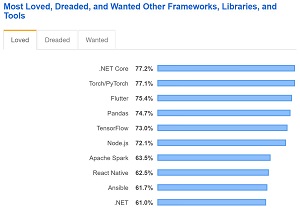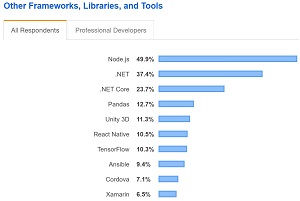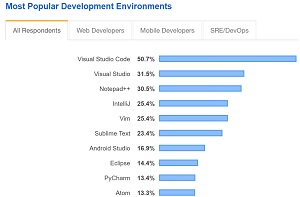News
.NET Core Is 'Most Loved' Framework in Stack Overflow Survey
Stack Overflow's huge annual developer survey is known for asking respondents what tools they most love, dread and want, and the new 2019 report identifies Microsoft's .NET Core as the "most loved" non-Web framework.
However, another question reveals that the traditional, ageing, Windows-only .NET Framework is still more popular (used by more respondents) than .NET Core, the new open source, cross-platform and modular implementation of .NET that represents the future of Microsoft-centric software development.
The survey also reveals that Microsoft rules in the "development environments" arena, as the Visual Studio Code editor was the overwhelming tool of choice, with the Visual Studio IDE taking the No. 2 spot.
In the "most loved" department, .NET Core just barely beat out Torch/PyTorch as the most loved offering in the category of "other frameworks, libraries and tools" (as opposed to Web frameworks).
".NET Core and Torch/PyTorch are both used less than other counterparts in their respective ecosystems (.NET and Tensorflow, respectively) but are loved by developers more," the report said.
 [Click on image for larger view.] Most Loved Frameworks (source: Stack Overflow).
[Click on image for larger view.] Most Loved Frameworks (source: Stack Overflow).
Stack Overflow defines "most loved" technologies as meaning "that proportionally, more developers want to continue working with these." Most dreaded, meanwhile, indicates a high percentage of developers who are currently using these technologies express no interest in continuing to do so.
The survey also gauged the most popular (commonly used) technologies, and in the "other frameworks, libraries and tools" (non-Web) category, the top three responses were: Node.js, 49.9 percent; .NET, 37.4 percent; and .NET Core, 23.7 percent.
 [Click on image for larger view.] Most Popular Frameworks (source: Stack Overflow).
[Click on image for larger view.] Most Popular Frameworks (source: Stack Overflow).
"This is the first year we've asked about many of the technologies in this category, and Node.js is the most commonly used," the report said. "More developers say they use .NET than .NET Core, and the deep learning framework TensorFlow is many times more popular than the deep learning framework Torch/PyTorch."
VS Code (50.7 percent) was the No. 1 most popular development environment, followed by Visual Studio (31.5 percent) and Notepad++ (30.5 percent). That's the exact same order followed in last year's survey, when VS Code garnered 34.9 percent of votes and Visual Studio 34.3 percent, showing that the lightweight, open source and cross-platform code editor is overshadowing its full-blown IDE cousin in many respects.
 [Click on image for larger view.] Most Popular Development Environments (source: Stack Overflow).
[Click on image for larger view.] Most Popular Development Environments (source: Stack Overflow).
VS Code was No. 1 overall and led in every breakdown of results (Web, mobile and SRE/DevOps) except mobile, where Android Studio just edged it out 54.2 percent to 53.8 percent.
"Visual Studio Code is a dominant player among developer environment tools this year," the survey said. "There are differences in tool choices by developer type and role, but Visual Studio Code was a top choice across the board. Developers who write code for mobile apps are more likely to choose Android Studio and Xcode. A popular choice for DevOps and SREs is Vim, and data scientists are more likely to work in IPython/Jupyter, PyCharm, and RStudio."
VS Code's lofty positioning has been quite rapid, considering that in the 2017 SO survey, VS Code placed no higher than fifth place among all segments -- Web developer, desktop, sysadmin/DevOps and data scientist/engineer.
It wasn't all great news for Microsoft-centric coders in the new report, though, as VBA (Visual Basic for Applications) was named the "most dreaded" programming language. Last year, Visual Basic 6 topped that list, with VB.NET coming in at No. 4 and VBA at No. 5.
Other highlights of the survey as summarized by SO include:
- Python, the fastest-growing major programming language, has risen in the ranks of programming languages in our survey yet again, edging out Java this year and standing as the second most loved language (behind Rust).
- Over half of respondents had written their first line of code by the time they were sixteen, although this experience varies by country and by gender.
- DevOps specialists and site reliability engineers are among the highest paid, most experienced developers most satisfied with their jobs, and are looking for new jobs at the lowest levels.
- Of the top countries on our survey, China has developers that are the most optimistic, believing that people born today will have a better life than their parents. Developers in Western European countries like France and Germany are among the least optimistic about the future.
- When thinking about blockers to productivity, different kinds of developers report different challenges. Men are more likely to say that being tasked with non-development work is a problem for them, while gender minority respondents are more likely to say that toxic work environments are a problem.
Methodology for the 2019 Stack Overflow Developer Survey says it's "based on a survey of 88,883 software developers from 179 countries around the world. This is the number of responses we consider 'qualified' for analytical purposes based on time spent on the full, completed survey; another approximately 400 responses were submitted but not included in the analysis because respondents spent less than three minutes on the survey."
About the Author
David Ramel is an editor and writer at Converge 360.